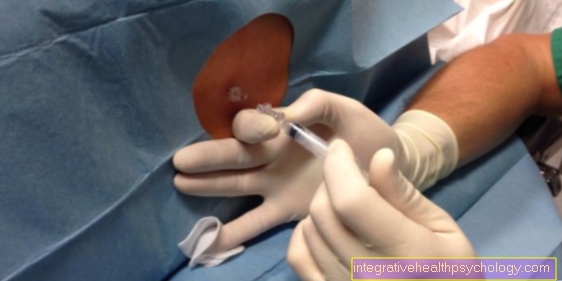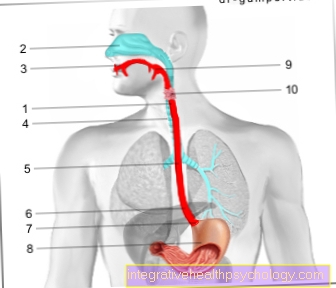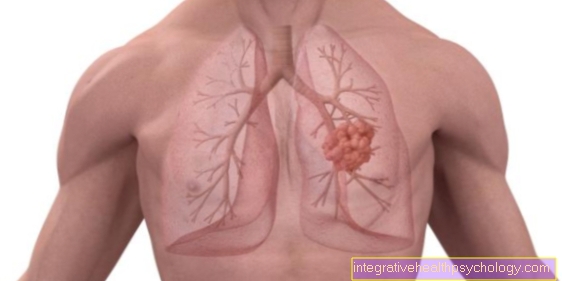Abscess in the intestine
definition
Abscesses are collections of pus that can appear in different parts of the body.
The abscess has its own capsule and creates its own body cavity by melting down tissue. One then speaks of a non-preformed body cavity. There can also be abscesses in the intestine due to various previous illnesses and causes. In the broadest sense, anal abscesses, the acute form of anal fistula, also belong to the intestinal abscesses.
Abscesses in the intestine are inflammatory processes that can burst (perforate) after a certain time. This allows the abscess contents to empty into the abdomen.

causes
An abscess in the intestine can develop due to various causes or previous illnesses.
Inflammatory processes in the intestine promote the development of abscesses. An abscess can then develop from an initial inflammation. Therefore, diseases in which there is high inflammatory activity are prone to abscesses.
Furthermore, abscesses can also develop more easily in diseases in which the immune system is weakened. So it is not surprising that a possible complication of diverticulitis is bowel abscess. Diverticulitis is an inflammation of so-called intestinal diverticula. These are protuberances in the intestinal wall that are found in more than 50% of people over 70 in industrialized nations. They arise due to various factors and can become inflamed in the course of life. Stool can accumulate in the diverticula and lead to impaired blood flow in the intestinal wall. Inflammation is the result. The inflammation spreads and abscesses develop, which can empty into the abdomen when the diverticulum breaks through.
Another disease that can be the cause of an intestinal abscess is Crohn's disease. This is a chronic inflammatory bowel disease, the cause of which is unclear. The high inflammatory activity in Crohn's disease often leads to the formation of fistulas and abscesses in the intestine.
Furthermore, a so-called perityphlitic abscess can develop in the context of appendicitis. This abscess is a complication of a ruptured appendix and must be operated on immediately.
Abscesses in the intestine can rarely also result from the introduction of foreign bodies into the intestine. This can happen both by swallowing the foreign body and by inserting an object anally. The foreign body is an inflammatory stimulus and can lead to the development of an abscess.
Chronic diseases like diabetes, HIV, or other diseases that suppress the immune system make it easier for infection and inflammation to spread to the intestines. Intestinal abscesses are rare, but can occur more easily with such a pre-existing condition.
Read more about this: Diverticulosis, ruptured appendix
diagnosis
Intestinal abscesses usually occur in the context of other pre-existing conditions, such as Crohn's disease or diverticulitis. They are to be seen as a complication of the disease and arise when the inflammation spreads.
Symptoms such as fever, a general feeling of illness, or abdominal pain may indicate an abscess in the intestine. In most cases, regular examinations by the family doctor or gastroenterologist are carried out in the case of existing pre-existing conditions, in which bowel abscesses tend to occur. In the case of new gastrointestinal complaints, a targeted search is made for any inflammation or abscesses.
A quick and easy test that can show up an abscess is an abdominal ultrasound. Fistulas and abscesses can be visible there. Other imaging methods, such as CT or MRI examinations, can be used to determine the exact location of the abscess. In the blood test, inflammation values such as CRP, the rate of sedimentation or leukocytes may be increased. However, these are non-specific values that do not have to be increased in a closed abscess. Ultimately, the diagnosis of an abscess is made through imaging tests.
Symptoms
The symptoms of a bowel abscess can vary widely. Possible symptoms that can indicate an abscess in the bowel are abdominal pain or cramps of varying intensity. Nausea, vomiting, fever or a general feeling of illness can also indicate an intestinal abscess. However, these are very unspecific symptoms that also occur as part of a common gastrointestinal infection.
Since intestinal abscesses are often found in the context of previous illnesses, special symptoms of this clinical picture or a worsening of the clinical picture can indicate the abscess as a complication. Diverticulitis manifests itself, for example, in acute pain on the left side of the lower abdomen. The pain is very severe and gets worse over time. Fever is also typical of such inflammation. Sudden diarrhea or constipation are common symptoms. Unfortunately, especially in older people, the symptoms are often very mild. Therefore, there is a risk that the abscess will not be recognized as such. A rupture of the abscess can even lead to an initial improvement in symptoms. After a while, however, the symptoms worsen again and severe abdominal pain, nausea and vomiting occur. A shock with unconsciousness is also a possible consequence.
In appendicitis, an abscess can easily mask the symptoms of the inflammation. It is not at all rare that in such a case only fever and a slight tenderness on pressure in the right lower abdomen are noticed. This is what makes the abscess so dangerous in appendicitis.
You might also be interested in:
- Lower abdominal pain
- Pain in a loop of intestine
Pain from an abscess in the intestine
An intestinal abscess can, but does not have to be, cause pain.
Often it is unspecific abdominal pain that is difficult to assign to an exact cause. However, bowel abscesses are very rare in otherwise healthy individuals. Usually there is a previous illness in which intestinal abscesses are possible complications. New abdominal pain is therefore investigated more closely in such people as there is a higher risk of complications. However, an intestinal abscess can also cause severe abdominal pain or abdominal pain, which is why those affected go to an emergency room straight away.
treatment
An abscess is a serious complication that needs to be treated promptly. If left untreated, a bowel abscess can rupture and have serious consequences that are potentially life-threatening.
Treatment of an intestinal abscess includes surgery on the one hand and antibiotic therapy on the other. The aim of the operation is to eliminate and clear out the abscess. The antibiotic therapy is supposed to prevent infections and further inflammation.
The surgical procedure is selected depending on the underlying pre-existing disease and type of abscess. In principle, both minimally invasive and open surgical procedures are possible. In a minimally invasive operation, the surgical instruments are inserted into the abdomen through small incisions. For an open operation, however, an abdominal incision is made. The abscess is cleared out and, if necessary, parts of the intestine are also removed if necessary. During such an operation it may be necessary to temporarily create an artificial anus. This is the case, for example, with complicated diverticulitis. The anus is then moved back into the abdomen after a few weeks.
Antibiotics are used for antibiotic therapy, which fight germs that are mainly found in the intestines. These include the antibiotics metronidazole, cefuroxime, ciprofloxacin or piperacillin and tazobactam. As a rule, two or more antibiotics are combined with one another in order to be able to fight as many germs as possible.
Apart from the special therapy of the abscess, the underlying disease in which the abscess occurred must also be treated. In the case of Crohn's disease, for example, what is known as maintenance of remission must take place after the operation of the abscess. This maintenance of remission includes treatment with medication designed to prevent the disease from recurring. These include glucocorticoids, which are similar to the body's own cortisone and have anti-inflammatory effects, as well as so-called immunosuppressants, which downregulate the activity of the immune system. In special cases, as an alternative to surgical relief of the abscess, a drain (see section Drainage) can be placed in the abscess, with the help of which it is emptied.
Operation of an abscess in the intestine
The bowel abscess must be surgically relieved and cleared in order to prevent potentially life-threatening complications.
An abscess can burst at any time. The likelihood of this increases day by day. Abscesses are cleared out in both emergency and planned operations.
If an abscess has already burst, an operation is also necessary to clean the abscess contents from the abdomen and, if necessary, to remove inflamed or dead intestinal tissue. Depending on the type of intestinal abscess, pre-existing intestinal diseases and the individual course, the appropriate surgical technique is selected. In some cases, a minimally invasive procedure can be selected in which the surgical instrument is introduced into the abdomen using small incisions. In a conventional operation, the abdominal cavity is opened with an incision in the abdomen to access the intestines. Severely inflamed parts of the intestine, such as appendicitis or diverticulitis, are also removed as part of such an operation.
It may also be necessary to temporarily create an artificial anus. However, this is more likely to be the case with very complicated courses. In the course of this, the artificial anus is relocated back to the abdomen in a second operation. After the operation, patients usually have to be cared for in an intensive care unit. A hospital stay of approximately 14 days or more is normal after such an operation.
Drainage for an abscess in the intestine
As an alternative to surgery, in some cases a drain can be placed in the abscess, which drains the abscess contents into a container.
The drain is placed in the right place with the help of an ultrasound device or CT imaging. This procedure is also known as sonography or CT-controlled. Nevertheless, an operation is usually carried out in the course of the process to remove the entire abscess, including its capsule and any inflamed parts of the intestine. One reason for inserting drainage beforehand can be a very poor general condition of the person concerned, which makes an immediate operation too risky.
Duration of an abscess in the intestine
An abscess in the intestine is an acute occurrence. The disease in which the abscess developed can, however, exist for a longer period of time. The abscess then forms on top of an existing inflammation. The inflammation can persist for weeks or be acute. Since a bowel abscess can burst within a few days or hours, it must be treated immediately.
Types of abscesses
Abscess from Crohn's disease
Crohn's disease is a chronic inflammatory bowel disease that usually occurs between the ages of 15 and 35.Year of age causes the first symptoms.
The causes of the disease are largely unclear. However, it is known that nicotine consumption is a risk factor for developing Crohn's disease. In addition, a family predisposition for the disease is known.
The disease is characterized by high inflammatory activity in the intestine and also in other parts of the body, such as the joints, skin or eyes. Patients with Crohn's disease usually suffer from chronic, bloodless diarrhea. In addition, people with Crohn's disease experience unpleasant side effects such as anal fistulas, intestinal constrictions or intestinal abscesses and anal abscesses.
Medicinal therapy for Crohn's disease with active ingredients that downregulate the immune system and glucocorticoids are intended to combat relapses in which symptoms occur. Complications such as abscesses are also prevented. If an abscess develops, it must be operated on and removed. In severe cases, parts of the intestine must also be removed. After an operation for Crohn's disease, postoperative drug therapy is usually continued. This is supposed to prevent the disease from relapsing and the recurrence of complications such as abscesses. The therapy, which lasts several months, includes the use of drugs that downregulate the immune system, such as azathioprine, 6-mercaptopurine or TNF-alpha inhibitors. These are very effective drugs, but often also have a lot of side effects.
Read more about this: Crohn's disease
Abscesses in the abdomen
Abscesses can not only form in the intestine, but also in the free abdominal cavity. In this case, it is called an intra-abdominal abscess.
However, such abscesses should not be confused with abscesses that actually arise in the intestinal tissue. Abscesses usually develop in the abdomen as a result or complication of an operation or an organ disease. Gastric ulcers or severe inflammation of the gallbladder can result in an abscess in the abdomen as a complication. Abscesses of the abdomen are potentially life threatening and must therefore always be treated.
What to do if the abscess has burst
Intestinal abscesses arise where there is inflammatory activity. The abscess virtually melts the tissue and builds its own body cavity. Unfortunately, this can easily burst and the abscess contents empty. This is a potentially life-threatening complication.
A ruptured abscess in the intestine must be operated on and cleared out immediately to prevent complications such as inflammation of the peritoneum (peritonitis) or blood poisoning (sepsis). One possible sign of a ruptured abscess is sudden freedom from symptoms. The most severe abdominal pain and complaints should therefore be clarified, especially in the case of previous illnesses such as Crohn's disease or diverticulosis, even if there is supposed to be an improvement.













.jpg)















